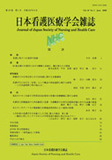Japanese
English
- 有料閲覧
- Abstract 文献概要
- 参考文献 Reference
要旨
この研究の目的は、在日カンボディア人の健康観および日本の医療施設を利用した際にもつ感情の特徴について明らかにすることである。研究方法は、レイニンガーの民族看護学を用いた。対象者は、8名のカンボディア人を主要情報提供者とした。さらに4名の日本人と18名のカンボディア人を一般情報提供者とした。データ収集は、情報提供者に対するインタビューとレイニンガーの観察−参加−再確認の2つの方法を用いた。レイニンガーの「データ分析ガイド」を使用し、分析した結果、以下の特徴が抽出された。
1)健康とは病気がなく元気な状態であり「食事」「運動」「清潔」「仕事」「天候」が影響する。
2)医療施設利用時に【言語の違いと医療用語に伴うストレス】【食習慣の違いによる病院食への違和感】【シャワーへのこだわり感】【採血への恐怖心】【生殖器に関する診察への強い羞恥心】【医療費に対する強い負担感】をもつ。
以上のような結果は、文化を考慮したケアを提供するための知識となるものである。
Abstract
The purpose of this study is to understand the views on health that Cambodian people living in Japan have, and the characteristics of their feelings when attending Japanese healthcare centers. Leininger's ethnonursing method was used for the study. Eight Cambodian people served as providers of key information and twenty two people(four Japanese people and eighteen Cambodian people)served as providers of general information. Data was gathered through interviews with the providers of information and Leininger's observation-participation-reflection process. The following characteristics were discovered upon analyses of the obtained data with use of Leininger's "Data Analyses Guide": 1)A state of good health is being of sound mind and body with no particular illnesses, and is affected by "food", "exercise", "cleanliness", "work", and "weather".
2)When attending healthcare centers, they have [stress associated with differences in languages and medical terms], [a dislike of hospital food due to different dietary habits], [preferences of showers], [a fear of having blood drawn], [a strong sense of shame during genital examinations], and [a strong feeling of being burdened by medical expenses].
Results such as the ones shown above are information for providing care that takes different cultures into consideration.
Copyright © 2008, Japan Society of Nursing and Health Care All rights reserved.


